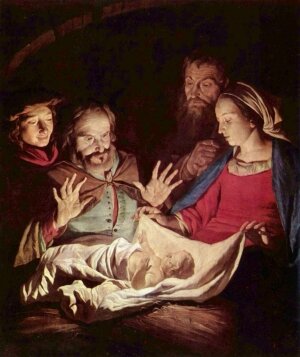 Academic discussions of the subject of the place of Jesus’ birth has been spreading Christmas cheer throughout the biblioblogosphere. Mark Goodacre’s podcast started it off, and Doug Chaplin, +Wrong and I all responded in different ways. The +Wrong discussion is particularly interesting since it offered examples of individuals who became known as “NAME 0f PLACE” where the place was not where they were born; to which Steph responded by pointing out that in such cases the place they were associated with was a place they became famous, and it is not clear that “Jesus of Nazareth” fits that category. (An example that comes to mind from a later time is Rumi).
Academic discussions of the subject of the place of Jesus’ birth has been spreading Christmas cheer throughout the biblioblogosphere. Mark Goodacre’s podcast started it off, and Doug Chaplin, +Wrong and I all responded in different ways. The +Wrong discussion is particularly interesting since it offered examples of individuals who became known as “NAME 0f PLACE” where the place was not where they were born; to which Steph responded by pointing out that in such cases the place they were associated with was a place they became famous, and it is not clear that “Jesus of Nazareth” fits that category. (An example that comes to mind from a later time is Rumi).
Historians are understandably skeptical and must consider the possibility that Jesus was associated with Bethlehem later. Because of the joint convictions that (a) Jesus was the Messiah, and (b) the Messiah has to come from Bethlehem, some Christians could well have drawn the conclusion that Jesus must have been from Bethlehem.
So far, so good. However, to make a historically plausible portrait of Jesus, it makes little sense to suggest that everything that could have fit with a Messianic identity or self-understanding comes from the later church. That scenario would involve a church taking an individual who resembled a Messiah in no respect and turning him into the Messiah after his death, which seems only marginally better than the implausible scenarios proposed by mythicists (i.e. those whom claim that Jesus was invented on the basis of myths without any historical figure being in view).
Most historical figures who are regarded as the Messiah, or as heroes, or as anything else, have some things about them that actually inspire that view, while they also tend to accrete legendary material as well. And so it seems to make good historical sense to try to maintain some balance in our discussions of Jesus. Any historical reconstruction that includes nothing that could have led people to think he might be the Messiah in the first place will be implausible, as will any historical reconstruction that makes him fit the role of Messiah so well that it is inexplicable why everyone didn’t identify him as such.
Whether birth in Bethlehem could be something that inspired people to think Jesus might be the Messiah – and perhaps even inspired Jesus himself to think this – is another question. My point is not to now try to bolster the historicity of these traditions. There is material outside of Matthew 1-2 and Luke 1-2 that justifies doubting whether anyone imagined that Jesus had been born in Bethlehem until much later. My point is rather to emphasize that, if some things were the result of a Messianic view of Jesus, we should not go to the extreme of thinking that all material, claims and events that could support a Messianic view of Jesus were later inventions.
To offer a somewhat frivolous example, those who look back on the figure of J. C. Penney and his desire to bring together the seemingly irreconcilable domains of God and mammon, faith and business, might skeptically suspect that he had changed his name – either because the coincidence of “JC” and “Penney” and the possible symbolism thereof seems too fortuitous, or because “James Cash Penney” itself sounds like an invention that reflects his later business success. But history surely includes many examples of people who, because of their name, their place of birth, or something else, were thereby inspired to think of themselves in grandiose ways and seek to achieve great things. Some of them managed to leave their mark on history. I’m guessing it wasn’t that Jesus was glowing in an unusual manner when he was born that inspired the Messianic interpretation of his life. But something did.
And so those of us who investigate Jesus as a historical figure need to be duly skeptical of material that may have been invented later. But we also need to be expectant that in the historical record there will be indications not just of the effects that were inspired by the Messianic interpretation of Jesus, but also of the causes that inspired Jesus and those after him to view him in Messianic terms in the first place.












